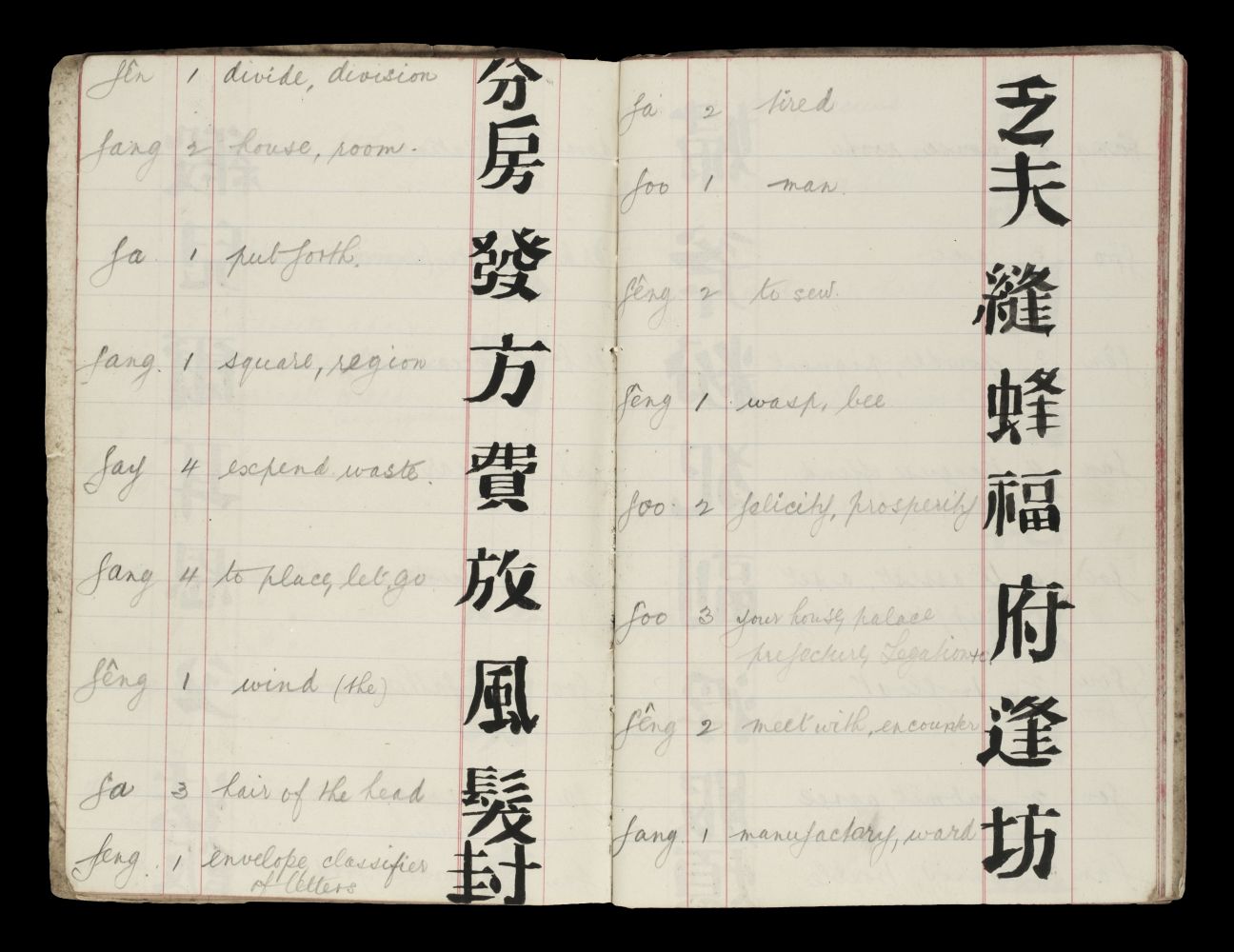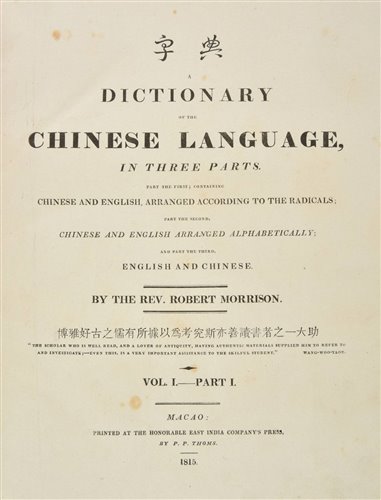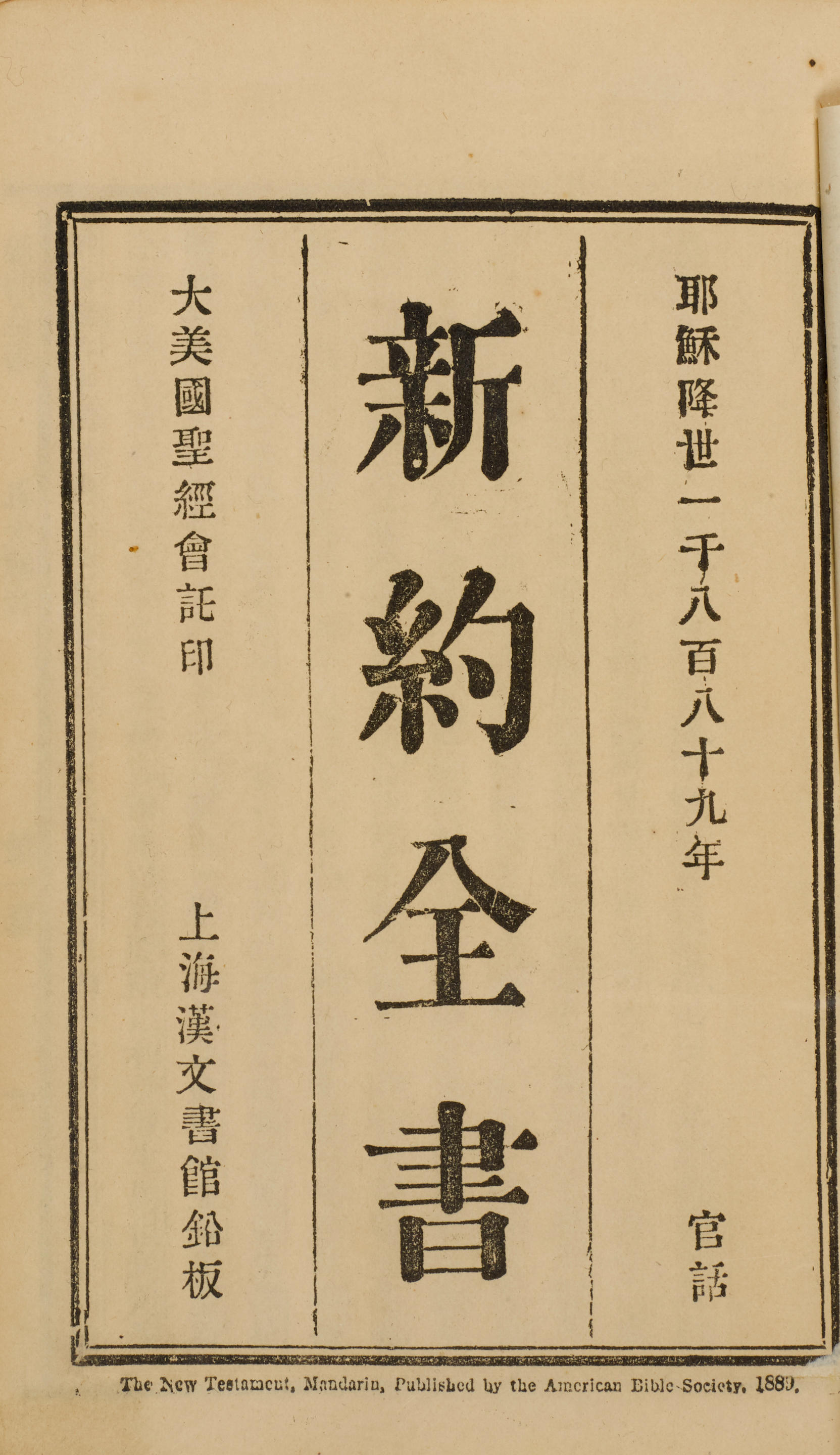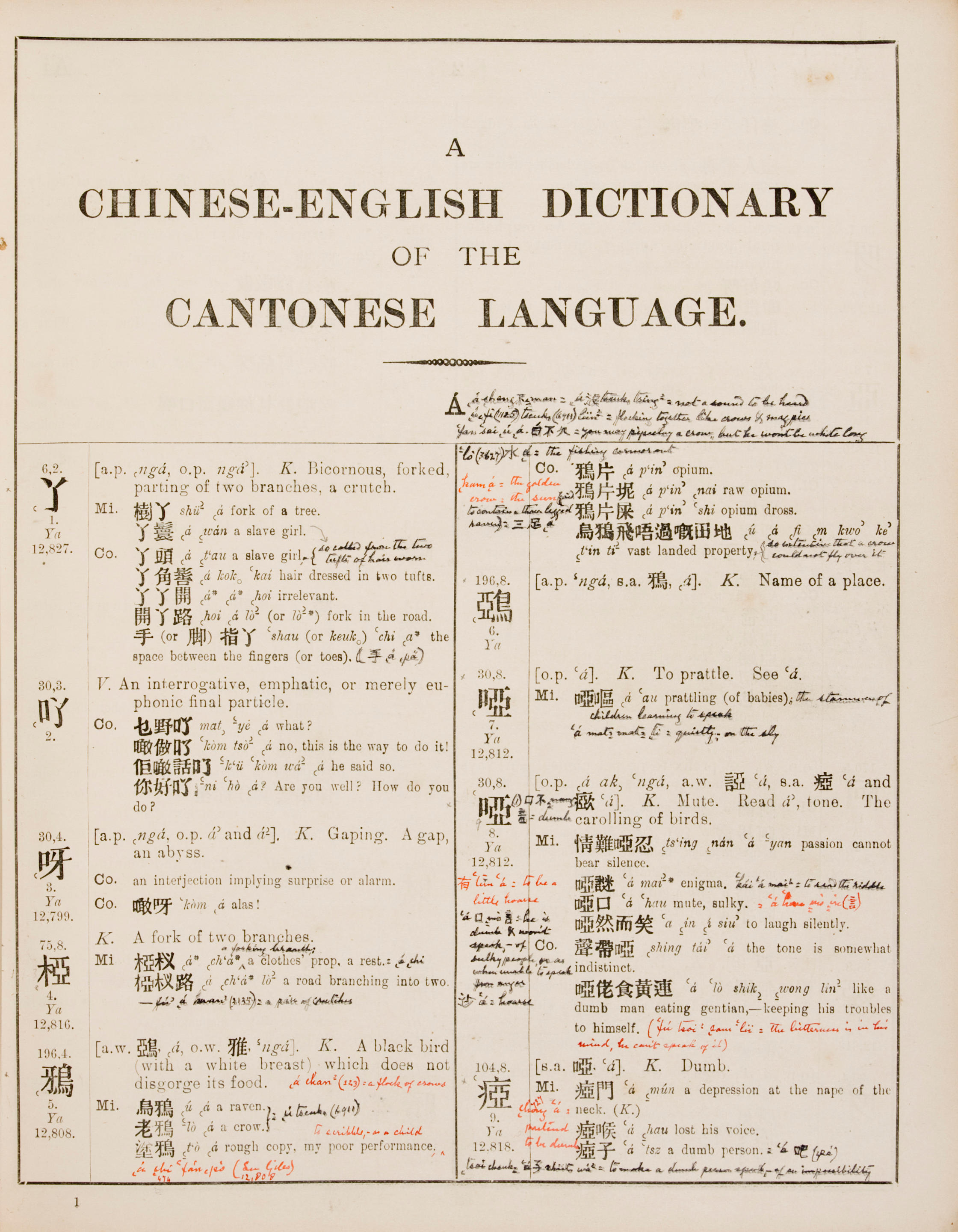A manuscript English/Chinese and Chinese/English Dictionary.
Boston, August 1818-24 March, 1819]. Manuscript in ink, 350 pages, 4to (244 x 185 mm). Modern half calf over marbled paper-covered boards an important early original manuscript: possibly the earliest substantial chinese/english dictionary, from a collection that was admired by thomas jefferson “I had not expected there was such a collection in the U.S.” The work consists of 1p headed "Scale of Principal sounds in English & Chinese"; 3pp. with headings, but otherwise blank; 104pp. an alphabetical index of English words or phrases with their equivalents in Chinese characters; 242pp., each divided into two vertical columns, with a listing of "13,316" characters with their meaning or meanings in English. James Winthrop, the translator/compiler gives some details of the genesis of work on the final leaf: "The foregoing is a translation of de Guignes great Chinese, french & Latin Dictionary, printed at Paris by order of Napoleon and finished in 1813. It was sent to me by an American Lady of my acquaintance who resides in Paris. I received it at Boston on 7 August, A.D. 1818 & about a week afterwards began this work, I finished it this 24th March A D 1819. Anno AEtatis 67. The original is a large folio of twelve hundred pages & printed on Vellum paper / James Winthrop." When Chrétien-Louis-Joseph De Guignes published the dictionary ( Dictionnaire chinois, français et latin. Paris: 1813), he omitted to mention that it was almost entirely copied from a manuscript version of the work of Basilio da Gemona, an oversight that led to charges of plagiarism. James Winthrop (1752-1821) was a founder member of the American Academy of Arts, and the Massachusetts Historical Society. Although he was an alumni of Harvard, his friendship with William Bentley and Timothy Alden induced him to leave his extensive and wide-ranging library to Allegheny College, of Meadsville, Penn. His copy of the Dictionnaire is among the books he gave to Allegheny (see p.15 of the 1823 catalogue of the books given by Winthrop). Edwin Wolf has written a fascinating overview of the Winthrop and the books he gave to Allegheny (see "http://library.allegheny.edu/Special/ObservationsPt2.htm "). He notes Winthrop's interest in philology and languages: "When it came to dictionaries, grammars, and other tools of language, the Winthrop library was nothing short of fantastic. Many of the basic books were the same as those in the Bentley collection, but Winthrop went far beyond even the gifted minister in this gathering of philological works …" Wolf was evidently unaware of the present manuscript, but writes on Winthrop's interest in China and the Chinese language, and the work on which the present manuscript is based: "There is no question whether James Winthrop used his Chinese books, for a manuscript on Chinese astronomy in his hand survives. He owned most of the best books on that language which were then available. He had the two major works of Etienne Fourmont, whom Louis XIV appointed to aid a young Chinese, Hoan-ji., in compiling a grammar, the Meditationes Sinicae and the Linguae Sinarum Mandarinicae Grammatica of 1737 and 1742 respectively. He had the elder De Guignes's Le Chou-King, 1770, and the younger De Guignes's handsomely printed folio Dictionnaire Chinois Francois et Latin , 1813, one of the monuments of Napoleonic scholarship. In addition to various classic texts and minor works, he bought the typographically impressive Explanation of tthe Elementary Characters of the Chinese by Hager, London, 1801, and Morrison's View of China for Philological Purposes , Macao, 1817." Wolf sums up the importance of the collection: "James Winthrop's library, including, of course the acquisitions of his father, was in its day one of the best private collections in Massachusetts. It reflected the interests of a bookman who had begun his career in a bookish home and nurtured those interests by serving for a brief time as Librarian of Harvard. Alleghany, as Jefferson so well noted
A manuscript English/Chinese and Chinese/English Dictionary.
Boston, August 1818-24 March, 1819]. Manuscript in ink, 350 pages, 4to (244 x 185 mm). Modern half calf over marbled paper-covered boards an important early original manuscript: possibly the earliest substantial chinese/english dictionary, from a collection that was admired by thomas jefferson “I had not expected there was such a collection in the U.S.” The work consists of 1p headed "Scale of Principal sounds in English & Chinese"; 3pp. with headings, but otherwise blank; 104pp. an alphabetical index of English words or phrases with their equivalents in Chinese characters; 242pp., each divided into two vertical columns, with a listing of "13,316" characters with their meaning or meanings in English. James Winthrop, the translator/compiler gives some details of the genesis of work on the final leaf: "The foregoing is a translation of de Guignes great Chinese, french & Latin Dictionary, printed at Paris by order of Napoleon and finished in 1813. It was sent to me by an American Lady of my acquaintance who resides in Paris. I received it at Boston on 7 August, A.D. 1818 & about a week afterwards began this work, I finished it this 24th March A D 1819. Anno AEtatis 67. The original is a large folio of twelve hundred pages & printed on Vellum paper / James Winthrop." When Chrétien-Louis-Joseph De Guignes published the dictionary ( Dictionnaire chinois, français et latin. Paris: 1813), he omitted to mention that it was almost entirely copied from a manuscript version of the work of Basilio da Gemona, an oversight that led to charges of plagiarism. James Winthrop (1752-1821) was a founder member of the American Academy of Arts, and the Massachusetts Historical Society. Although he was an alumni of Harvard, his friendship with William Bentley and Timothy Alden induced him to leave his extensive and wide-ranging library to Allegheny College, of Meadsville, Penn. His copy of the Dictionnaire is among the books he gave to Allegheny (see p.15 of the 1823 catalogue of the books given by Winthrop). Edwin Wolf has written a fascinating overview of the Winthrop and the books he gave to Allegheny (see "http://library.allegheny.edu/Special/ObservationsPt2.htm "). He notes Winthrop's interest in philology and languages: "When it came to dictionaries, grammars, and other tools of language, the Winthrop library was nothing short of fantastic. Many of the basic books were the same as those in the Bentley collection, but Winthrop went far beyond even the gifted minister in this gathering of philological works …" Wolf was evidently unaware of the present manuscript, but writes on Winthrop's interest in China and the Chinese language, and the work on which the present manuscript is based: "There is no question whether James Winthrop used his Chinese books, for a manuscript on Chinese astronomy in his hand survives. He owned most of the best books on that language which were then available. He had the two major works of Etienne Fourmont, whom Louis XIV appointed to aid a young Chinese, Hoan-ji., in compiling a grammar, the Meditationes Sinicae and the Linguae Sinarum Mandarinicae Grammatica of 1737 and 1742 respectively. He had the elder De Guignes's Le Chou-King, 1770, and the younger De Guignes's handsomely printed folio Dictionnaire Chinois Francois et Latin , 1813, one of the monuments of Napoleonic scholarship. In addition to various classic texts and minor works, he bought the typographically impressive Explanation of tthe Elementary Characters of the Chinese by Hager, London, 1801, and Morrison's View of China for Philological Purposes , Macao, 1817." Wolf sums up the importance of the collection: "James Winthrop's library, including, of course the acquisitions of his father, was in its day one of the best private collections in Massachusetts. It reflected the interests of a bookman who had begun his career in a bookish home and nurtured those interests by serving for a brief time as Librarian of Harvard. Alleghany, as Jefferson so well noted












Testen Sie LotSearch und seine Premium-Features 7 Tage - ohne Kosten!
Lassen Sie sich automatisch über neue Objekte in kommenden Auktionen benachrichtigen.
Suchauftrag anlegen